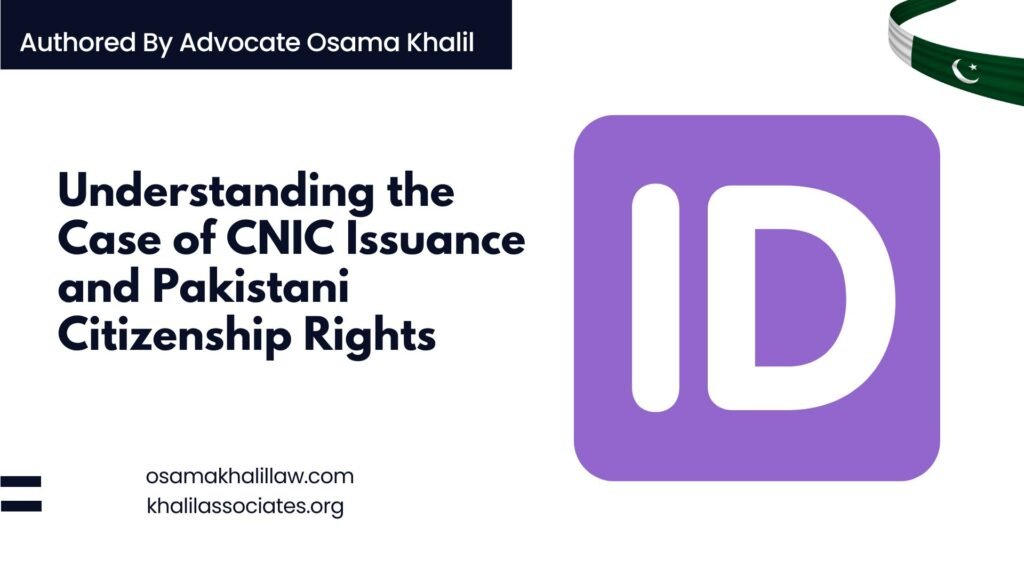
In 2022, the court ruled on a case involving the CNIC Blockage Authority. NADRA blocked the petitioner’s CNIC, and he challenged the Family Court’s order that allowed this. Hafiz Awais Zafar, the petitioner, argued that NADRA did not have the legal right to block his CNIC. The court’s decision clarified the limits of NADRA’s power and addressed important constitutional issues related to identity.
The case sheds light on how CNIC blockage affects fundamental rights like identity. The court ruled that NADRA cannot block CNICs without a proper legal process. This ruling is vital for understanding the CNIC Blockage Authority and how courts must protect citizens’ identity rights.
The Background of the Case
The petitioner, Hafiz Awais Zafar, faced a court order to block his CNIC. The order came after he failed to satisfy a family court’s decree. The Family Court had ruled in 2020 that he must pay dower, but he did not comply. After his failure to appear, the Family Court instructed NADRA to block his CNIC in 2021.
Zafar argued that NADRA had no legal power to block his CNIC. He filed a petition challenging the order and questioned the legal validity of the CNIC Blockage Authority used in this case.
NADRA’s Power to Block CNICs
The court examined the National Database and Registration Authority Ordinance (2000). Section 18(1) of this ordinance outlines NADRA’s authority to cancel, impound, or confiscate CNICs. However, this action can only happen under specific conditions listed in Section 18(2). The court emphasized that the CNIC Blockage Authority must strictly follow these legal guidelines. The court ruled that NADRA could not block a CNIC without meeting these conditions.
The court’s ruling emphasized that CNIC blockage, especially to enforce court orders, violates the law. NADRA cannot block CNICs without a valid legal reason.
The Role of the Family Court
The Family Court overstepped its jurisdiction, according to the court’s opinion. The CNIC Blockage Authority does not lie within the Family Court’s power. The Family Court cannot order NADRA to block a CNIC. Court ruled that the Family Court’s order lacked legal authority because blocking a CNIC is outside the scope of its jurisdiction.
The court further clarified that the blocking of CNICs should be handled by NADRA and must follow the law. The court cannot use CNIC blockage as a tool to compel someone to attend a court session.
The Importance of CNICs
The CNIC plays a crucial role in everyday life in Pakistan. It serves as the primary proof of identity for citizens. Without a CNIC, people cannot access essential services like healthcare, banking, or education. The CNIC Blockage Authority directly impacts a person’s ability to function in society. The court acknowledged that blocking a CNIC affects dignity and restricts access to fundamental rights.
The court emphasized that NADRA must respect the legal process when it comes to the CNIC Blockage Authority. It cannot block a CNIC arbitrarily, as this would deny citizens their rights.
The Court’s Decision
The court ruled in favor of the petitioner, Hafiz Awais Zafar. The court stated that NADRA did not have the legal authority to block his CNIC in this case. The CNIC Blockage Authority outlined in Section 18 of the ordinance does not support blocking a CNIC just to enforce court orders. The court declared the order from the Family Court invalid and set it aside.
This decision reinforced the principle that NADRA’s actions must be based on law. The court stressed that citizens have the right to their CNIC, and the CNIC Blockage Authority cannot be used without proper legal justification.
Constitutional Rights: The Right to Identity
The court referred to the constitutional protection of identity under Articles 9 and 14. Article 9 guarantees the right to life and liberty, while Article 14 protects dignity. The court ruled that the CNIC Blockage Authority violates these rights. By blocking a CNIC, NADRA infringes on the right to identity. The court stated that citizens cannot lose their CNIC without due process, as it is essential for accessing services and exercising rights.
Legal Framework for CNIC Blockage
The court’s decision reaffirmed the importance of following the legal framework when dealing with CNIC blockage. Section 18(2) of the National Database and Registration Authority Ordinance clearly defines when a CNIC can be blocked. These criteria include cases where the CNIC is forged or obtained fraudulently. The court emphasized that NADRA must follow these legal guidelines strictly.
The court also pointed out that CNIC Blockage Authority cannot be used to enforce court orders. NADRA must ensure its actions comply with the law, and blocking a CNIC should not happen without proper legal grounds.
Impact on Future Cases
This ruling sets an important precedent. It clarifies the limits of CNIC Blockage Authority and protects citizens’ rights to identity. The court has now made it clear that NADRA cannot block CNICs without following proper legal procedures. This decision strengthens citizens’ rights to identity and provides guidance for future cases involving CNIC blockage.
Conclusion: Protecting the Right to Identity
The court’s decision in this case highlights the importance of following due process when dealing with CNIC blockage. The CNIC Blockage Authority must always be exercised in accordance with the law. The court confirmed that no one can lose their CNIC without valid legal reasons. It reaffirmed the right to identity as a fundamental right that must be protected under the Constitution.
This case serves as a reminder that all citizens have the right to their CNIC. NADRA and the courts must respect this right and ensure that any action affecting a person’s CNIC follows proper legal procedures.
Legal Assistance
For professional legal guidance and support in immigration matters, you may contact:
Mr. Osama Khalil
Lawyer & Legal Consultant
📞 Phone: 0316-1829946
📧 Email: contact@osamakhalillaw.com | contact@khalilassociates.org
